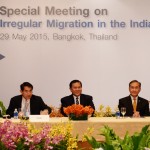
By Pichai Chuensuksawadi, Patsara Jikkham, and Jeerawat Na Thalang, The Bangkok Post on 27 March 2015, Prime Minister Prayut Chan-o-cha has vowed to take legal action against any private companies found to have used forced labour in the fishing industry. He had seen an Associated Press (AP) report regarding slave labour on the Indonesian island village of Benjina which found links between fish caught there and Thai ports. "I have received the AP report that a Thai fishing company used slave labour including Myanmar and Thai workers. This company catches fish at Benjina and brings the catch back to Thai piers," Gen Prayut said. He said the government has now declared efforts to combat human trafficking as a national priority. This means all agencies must take immediate action.
Deputy Foreign Minister Don Pramudwinai said the government will summon owners of fishing trawlers accused of using slave labour to give information. If they are found guilty as alleged, they must be dealt with severely, he said. Adding to that, Gen Prayut said the government will step up efforts to prosecute any private companies involved in forced labour so they can no longer run their businesses in the country. "If they still continue to exploit their fellow human beings, they should not be given any licences to operate businesses in Thailand, and they must receive the punishment they deserve," Gen Prayut said. Gen Prayut said he has raised the matter with Deputy Prime Minister Prawit Wongsuwon, who oversees measures to tackle human trafficking.
The government also has told state agencies to send delegations to discuss the issue with Indonesian authorities today. The two sides will gather evidence to bring those involved in exploiting forced labour to book and to help workers falling victim to forced labour, the prime minister said. Gen Prayut also thanked members of the media for presenting reports on the matter — a softening of his earlier stance on the matter when he chastised the media for running stories about trafficking in the industry which put Thailand in a poor light. "I know that every one of you wants to do your job to the best of your ability to help the victims. I think we are on the same team," Gen Prayut said. Gen Prayut urged the media and the public to provide the government with information about those involved in slave labour. He said joint efforts from all sectors and collaboration with neighbouring countries are needed to address the problem.
Thailand is making efforts to push for cooperation with neighbouring countries to combat illegal fishing and human trafficking in the fishing industry. From April 1, all Thai fishing boats will be checked to comply with European Union (EU) fishing standards before being allowed to sail, while boat owners and officials will be prosecuted if violations are detected. This applies not only to violations of the fishing regulations but all cases of forced or slave labour in the industry, Gen Prawit told the Bangkok Post Thursday. Gen Prawit has been assigned to implement the prime minister's agenda against human trafficking. This includes changes to laws and the judicial process aimed at improving the country's position in the US report on Trafficking in Persons. Since January, efforts have also been made to make Thai fishing boats comply with EU standards on Illegal, Unreported and Unregulated (IUU) fishing, to avoid sanctions that would hurt the country's multi-billion-baht industry. "From next month all Thai vessels leaving our ports must be registered. Workers on board — whether Thai or foreign labour — must be registered and vessels equipped with monitoring systems according to international standards," the deputy prime minister said.
The navy will track the fishing boats and if any violations discovered, prosecution will follow with no exceptions. Thailand has registered 1.6 million foreign workers. The government wants to make sure all foreign workers on Thai boats are registered. In the past, many boats would take on board foreign workers while out at sea. If this is detected, action will be taken against owners and officials, he said. The government has informed the EU of measures taken to date. Indications are the EU would postpone its decision to issue a yellow card. Originally, the EU planned to issue a yellow card against Thailand for failing to follow its IUU standards this month. A yellow card means that Thailand would have 180 days to improve, or face sanctions. If it failed to do so within this time frame, a red card would be issued. A red card means the EU can ban imports of fisheries products from Thailand.
Commenting on reports of Thai fishermen stuck in Ambon, Indonesia, Gen Prawit said he has sent a combined team comprising police, the Foreign, Labour and Health ministries to bring back the Thai fishermen. "We are not sure how many Thais are stuck there," he said, adding that up to 400-500 vessels are impounded in Indonesia. He said the nationalities of workers on these vessels — who could come from Myanmar, Laos and Vietnam — need to be verified. But he said all Thais would be brought home. Sompong Srakaew, director of Labour Rights Promotion Network Foundation, said there are 31 Thai fishermen at the immigration office in Ambon island in Indonesia, of whom 26 people are likely to be repatriated soon.
Source: http://www.bangkokpost.com/news/general/509583/slave-boat-owners-in-govt-sights




